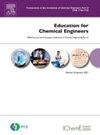A team-based activity integrated with comics for introducing the Sustainable Development Goals in classrooms
IF 2.3
2区 教育学
Q1 EDUCATION, SCIENTIFIC DISCIPLINES
引用次数: 0
Abstract
In the modern world, sustainability is crucial to human existence, and it is essential to introduce students to the Sustainable Development Goals (SDGs) of the United Nations. This is regarded as a framework that underpins societal challenges and the benefits of addressing them. Moreover, in the domain of chemical engineering education, introducing SDGs into the curriculum could help students understand how chemical engineers will play a vital role in addressing some of the key global challenges. This study proposes a novel team-based activity that aids the understanding of international relations, and cooperation needed to achieve the SDGs as well as the challenges faced among nations. The team-based activity also introduces the concept of water-waste-energy nexus to help science and engineering students understand the current societal challenges and propose solutions from the lens of an engineer or scientist. The team-based activity including the comics were tested in classrooms with students from universities in Africa and England. The students were grouped into eight countries with distinct resources and challenges. The results revealed an enhanced understanding of the SDGs by the students and the interconnectedness and importance of addressing multiple goals at once by each simulation country. While participants from Africa were more focused on urgent, local sustainable development issues such as zero hunger (SDG2), quality education (SGD4) and clean water (SDG6), participants from the UK were probably more focused on global, policy-oriented issues such as clean energy (SDG7), sustainable cities (SDG11) and climate change (SDG13). The activity significantly enhanced students' understanding of the SDGs, global challenges and the water-energy nexus. However, future studies should focus on comprehensive feedback collection from participants. This will help improve the coherence and effectiveness of the activity, leading to better student comprehension of sustainable development concepts and an increased ability to apply these ideas practically.
一个以团队为基础的活动,结合漫画,在课堂上介绍可持续发展目标
在现代世界,可持续发展对人类的生存至关重要,向学生介绍联合国的可持续发展目标(SDGs)至关重要。这被视为支持社会挑战和解决这些挑战的好处的框架。此外,在化学工程教育领域,将可持续发展目标引入课程可以帮助学生了解化学工程师如何在应对一些关键的全球挑战方面发挥至关重要的作用。本研究提出了一种新颖的团队活动,有助于理解国际关系,实现可持续发展目标所需的合作以及国家间面临的挑战。这项以团队为基础的活动还引入了水-废物-能源联系的概念,以帮助理工科学生了解当前的社会挑战,并从工程师或科学家的角度提出解决方案。包括漫画在内的团队活动在教室里与来自非洲和英国大学的学生进行了测试。这些学生被分成八个国家,各自拥有不同的资源和挑战。结果显示,学生们对可持续发展目标的理解有所提高,每个模拟国家同时实现多个目标的关联性和重要性也有所提高。来自非洲的与会者更关注紧迫的地方可持续发展问题,如零饥饿(SDG2)、优质教育(SGD4)和清洁水(SDG6),而来自英国的与会者可能更关注全球性的政策导向问题,如清洁能源(SDG7)、可持续城市(SDG11)和气候变化(SDG13)。该活动极大地增进了学生们对可持续发展目标、全球挑战和水-能源关系的理解。然而,未来的研究应侧重于全面收集参与者的反馈。这将有助于提高活动的连贯性和有效性,使学生更好地理解可持续发展概念,并提高实际应用这些概念的能力。
本文章由计算机程序翻译,如有差异,请以英文原文为准。
求助全文
约1分钟内获得全文
求助全文
来源期刊

Education for Chemical Engineers
Multiple-
CiteScore
8.80
自引率
17.90%
发文量
30
审稿时长
31 days
期刊介绍:
Education for Chemical Engineers was launched in 2006 with a remit to publisheducation research papers, resource reviews and teaching and learning notes. ECE is targeted at chemical engineering academics and educators, discussing the ongoingchanges and development in chemical engineering education. This international title publishes papers from around the world, creating a global network of chemical engineering academics. Papers demonstrating how educational research results can be applied to chemical engineering education are particularly welcome, as are the accounts of research work that brings new perspectives to established principles, highlighting unsolved problems or indicating direction for future research relevant to chemical engineering education. Core topic areas: -Assessment- Accreditation- Curriculum development and transformation- Design- Diversity- Distance education-- E-learning Entrepreneurship programs- Industry-academic linkages- Benchmarking- Lifelong learning- Multidisciplinary programs- Outreach from kindergarten to high school programs- Student recruitment and retention and transition programs- New technology- Problem-based learning- Social responsibility and professionalism- Teamwork- Web-based learning
 求助内容:
求助内容: 应助结果提醒方式:
应助结果提醒方式:


